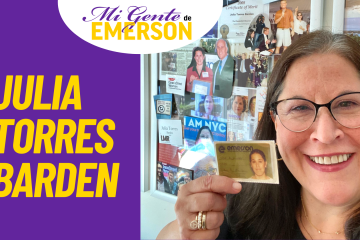Improv can be a bit terrifying to many. If you’ve never taken an acting class and have any level of stage fright, the idea of getting up with and in front of people without a script can be nerve-wracking, to say the least. At the same time though, you don’t have to be auditioning to be in an improv troupe to get something out of it.

Recently a colleague of mine asked me about the impact of improv for career planning. In our work, we do a lot not only helping a student or alum polish their resume or profile, but also with the task of presentation. This shows up when:
- Giving class presentations
- Interviewing to a selection committee
- Presenting a business idea to investors (gulp!)
- Pitching a story idea
- Giving a speech or leading a panel
- Representing a student organization
- Networking for the first time
Any of the above or more requires that you be prepared, but also comfortable in your skin. Improv is about that delicate balance of both. Below are some ways that improv can help you.
Being Present
The time spent in the space of your mind, with worry, self-doubt, wanting to get all the right information, can leave you neglecting the space around you. This is the space you share with your peers, industry professionals, and alumni who want more than just a well-packaged brand. In career services, we talk about professional brand a lot. Here’s the reality: a professional brand can’t work without the drive, genuine interest and curiosity behind it. Make sure that the hard work you put in to make a strong impression includes making genuine connections and being your authentic self as a writer, marketer, educator, etc. Be engaged.
Getting Comfortable with the Unknown
There’s a well-known improv exercise called “Yes And”, where a story unfolds with actors who are all contributing to telling a story. It requires collaboration, active listing and being accepting of whatever dialogue comes your way. When practicing your interviews, it’s helpful to think about:
- Interviewers style
- Number of interviewers
- Type of position
- Culture of company
This is all useful to consider for an interview, but know that personalities, small talk and even order of questions are never 100% predictable. Being open to this allows you to feel more comfortable embracing that unknown and therefore more confident and in the moment.

Listening Actively
It’s understandable that you want to make the best impression. In doing so, however, be careful not to speak without listening first. When we’re eager to answer questions, we sometimes don’t hear the full question. In the moment, improv requires you to pay close attention and show that you not only work hard but work hard as a collective unit with your colleagues.
Showing That You’re Flexible
The shifts in work culture have posed the question: “You can do the job, but do we want to work with you?” The community that many companies aim to establish include folks who are passionate, but not so rigid with opinions and ideas that they could alienate others. Improv definitely requires relaxing and staying open with other folks contributions.
Having Fun
Yes, I said it. Having fun. This is graduate school and of course, you’re at a stage in your life where you’re here to meet professional goals. But remember that through all stresses and expectations of grad work, you have to show that you love the work. That will indeed make you memorable!
Check out some great local improv companies here in Boston! Get out there and play. 🙂

